 Iran’s Attack on Israel
Iran’s Attack on Israel
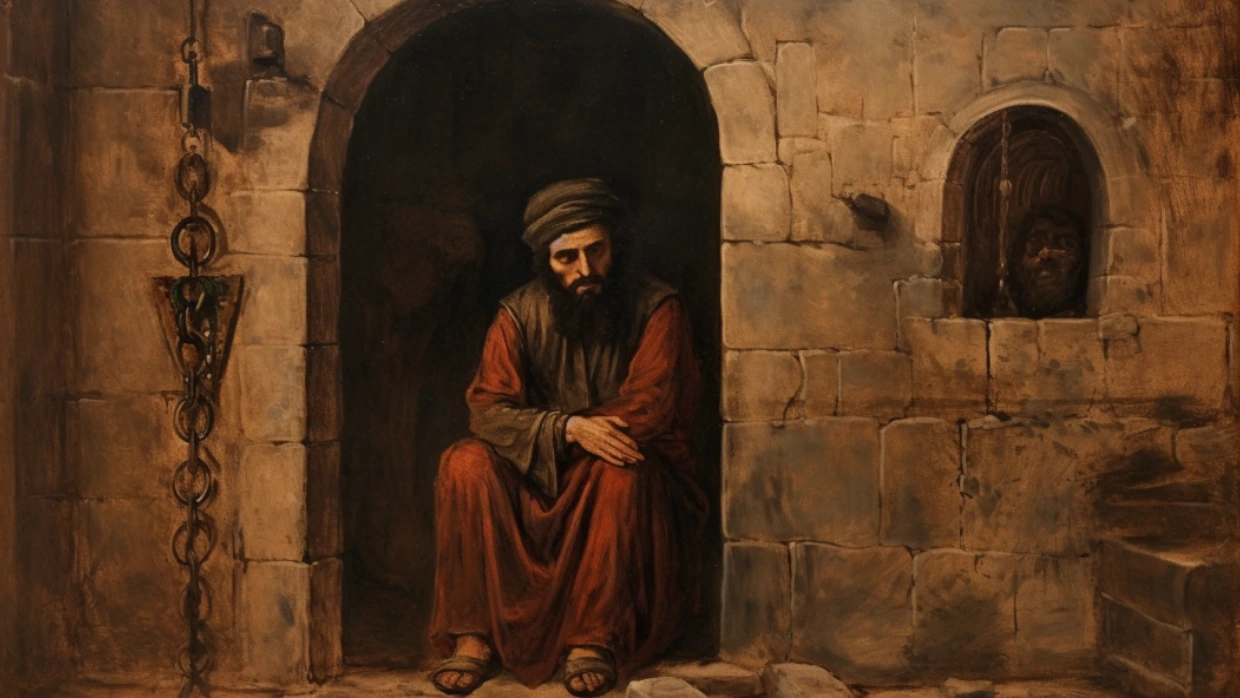

13 min read
The blood libel – a throwback to the antisemitism of the Dark Ages – was initially accepted as fact by almost the entire European press, shocking world Jewry into action.
The Damascus Affair of 1840 was an infamous blood libel that became international news and led to one of the first instances in which Jewish communities around the world worked together to demand justice for another Jewish community. The Damascus blood libel is recognized as one of the turning points of modern Jewish history when world Jewry realized the importance of uniting to advocate for each other.
On February 5, 1840, Father Thomas, an Italian Friar of the Capuchin Order who lived in Damascus, disappeared with his Muslim servant Ibrahim Amara. They were assumed murdered, possibly by businessmen with whom Thomas had had shady dealings or by a Muslim who was infuriated by an insult to Islam that Father Thomas had uttered.
But the Jews were to bear the blame as the Capuchins friars began spreading rumors that the Jews had murdered the two men to use their blood for Passover. This led to one of history's most famous blood libels, the Damascus Blood Libel, better known as the Damascus Affair of 1840.
Damascus was then under the rule of the Ottoman Empire. Since the Ottoman Empire was weak, the Ottomon governor of Egypt, Muhammed Ali Pasha was the one primarily ruling over both Egypt and Syria as quasi-independent principalities, with just nominal subervience to the Ottomon Empire. France also retained some measure of rule in Syria, since the French had maintained a presence in Syria from the time of the Crusades. The Catholics of Syria, including Father Thomas, were officially under French protection.
Due to the French jurisdiction over this case, the French consul, Ulysse de Ratti-Menton, known for his anti-Jewish views, presided over the investigation. Along with the governor-general Sharif Pasha, he conducted a short investigation and a barber named Shlomo Negrin, among others, was arbitrarily arrested and tortured. They managed to extort a “confession” from Negrin that the monk had been killed in the house of David Harari by seven Jews. The men whom he named were arrested and tortured. Two of the arrested men died, one converted to Islam to be spared, and the statements made under torture by the others were considered adequate as an admission of guilt.
Bones that were discovered in a sewer were “identified” as that of the monk and buried in a funeral on March 2nd, which increased the anger against the Jews. The inscription on the monk’s tombstone stated that this was the grave of a saint tortured by the Jews. After the “funeral,” attacks began against the Jews, and Sharif Pasha had to move hundreds of soldiers to protect the Jewish quarter.
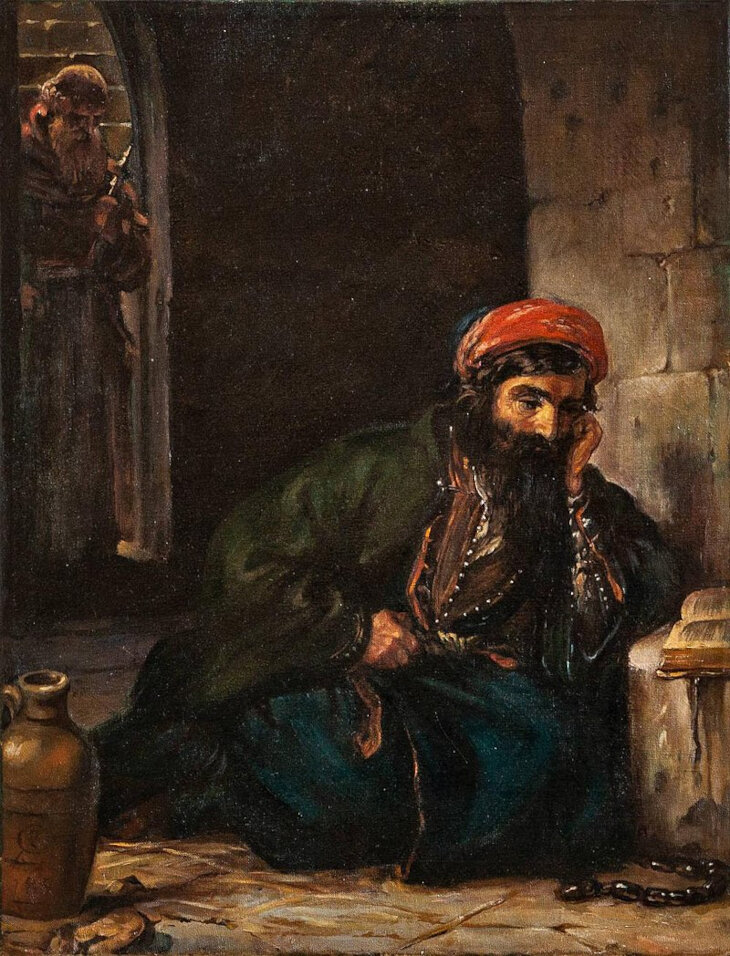 Jewish prisoner preparing his defense, a Capuchin distant in the doorway. Painting by Jewish painter Moritz Daniel Oppenheim.
Jewish prisoner preparing his defense, a Capuchin distant in the doorway. Painting by Jewish painter Moritz Daniel Oppenheim.
The focus of the “investigation” was now on the servant, Ibrahim Amara. More torture extracted the “confession” that he had been murdered by Jews, among them members of the prominent Farhi and Picciotto families, and the authorities sought to arrest them. Knowing the torture that they would be subjected to, some of the accused tried to hide or escape. Rabbi Yaakov Antebi, accused of having received a bottle of the blood of Thomas, was arrested and tortured, yet he held strong under the torture and would not confess to anything.
More bones were found and the investigators claimed they were the remains of Ibrahim Amara. However, the physician in Damascus, Dr. Lograso, did not believe they were human bones and, considering the pressure on him, requested that the bones be sent to Europe for examination. Ratti-Menton refused and instead announced that based on the confessions of the accused and the remains found of the victims, the guilt of the Jews in the double murder was proven beyond a doubt.
One of the Jews who was arrested during the second round of accusations, was Isaac Levi Picciotto, an Austrian citizen and thus under the protection of the Austrian consul. Initially, he was also subject to torture, but on March 8th, there was a sudden turnabout. The Austrian vice-consul, Caspar Giovanni Merlato, a personal friend of Picciotto, demanded that Picciotto be returned to Austrian jurisdiction and that they would carry out the investigation at the Austrian consulate.
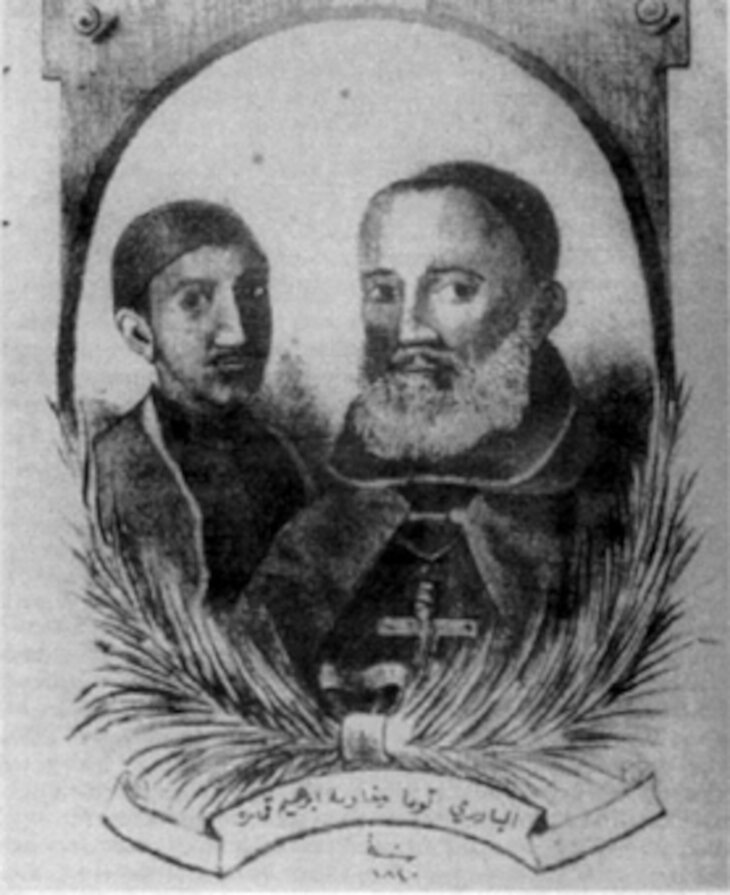 Contemporary drawing of Father Thomas and his servant Ibrahim Amara
Contemporary drawing of Father Thomas and his servant Ibrahim Amara
With Merlato’s involvement, things changed dramatically. Picciotto proved he was in a different place the evening of the murder, and a Christian corroborated this. Picciotto now moved from the defensive to the offensive and began accusing officials of instigating this blood libel, carrying out investigations under torture, and openly accusing Ratti-Menton of murder. He demanded that the Austrian authorities carry out the investigation. As torture methods were seen as unjust, cruel, and backwards by Western countries, his accusations put Ratti-Menton and his aides on the defensive.
The predictable result of the accusations was that the Jews of Damascus and other parts of Syria began to suffer from antisemitic mobs. Synagogues were destroyed and looted, cemeteries were desecrated, and Jews were attacked all over the country.
News of the atrocities spread throughout the Jewish world, causing waves of shock and anger at what was going on in Syria.
The first Jewish attempt to intervene in the tragic situation came via a petition initiated by Israel Bak addressed to Muhammad Ali, as he was the governor over Syria. At the same time, the Austrian Consul General in Egypt, Anton Laurin, received a report from the Austrian consul in Damascus. Recognizing the tremendous injustice, Laurin became very involved in the case, and he began by using his influence to petition Muhammad Ali to stop the torture methods used by the investigators.
Muhammad Ali agreed, and instructions were issued accordingly to Damascus by express courier. As a result, the use of torture came to an end on April 25, 1840, which caused a new round of riots in Damascus.
The accusation of murder and blood libel remained, and the investigation against the Jews continued, albeit without torture. Now, Austrian Consul General Laurin tried to influence the consul general of France in Egypt to order his subordinate Ratti-Menton to stop the libel, but this was unsuccessful. At this point, Laurin went against all procedures and decided to send the information he received from Damascus to Baron James de Rothschild, the honorary Austrian consul in Paris.
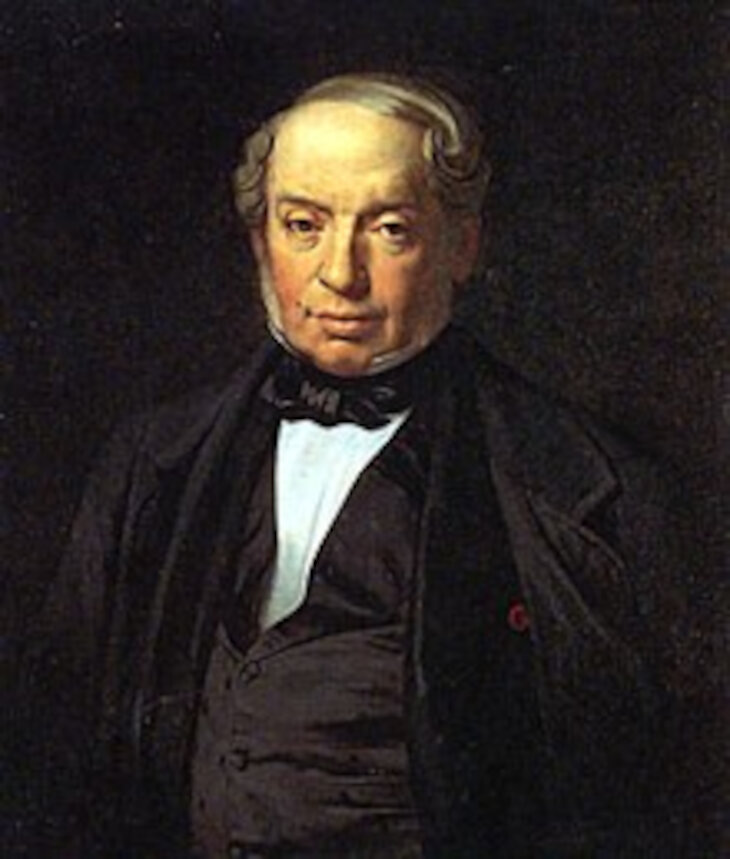 Baron James de Rothschild
Baron James de Rothschild
Baron Rothchild appealed to the French government to stop the injustice, and when his appeals to the French government were ignored, Baron Rothschild chose to turn to the media and published the report in newspapers worldwide to create public pressure to stop this travesty of justice.
His brother in Vienna, Solomon Rothschild, worked alongside him and used his influence to speak to Chancellor Klemens von Metternich about the situation. Metternich ultimately supported his consul Laurin since the negative publicity for France, archenemy of the Austro-Hungarian empire, was to his benefit. The British also chose to support the Jews in fighting the libel, and the British consul general of England in Egypt expressed those policies.
As a result of the advocacy, a message was sent to Damascus on May 3, 1840, ordering protection for the Jews from the violence of Muslim and Christian mobs.
Western Jews in Europe and America were incensed at what was happening in Damascus. Europeans and American Jews lobbied their governments to intercede on behalf of the Jews in Damascus. In what was then an entirely novel approach, 15,000 Jews in six American cities gathered and protested on behalf of their fellow Jews in Syria.
In what was then an entirely novel approach, 15,000 Jews in six American cities gathered and protested on behalf of their fellow Jews in Syria.
In response to the advocacy, government leaders condemned the libel and attempted to intervene on behalf of the accused Jews. Among them were Queen Victoria, Lord Henry Palmerston, U.S. Secretary of State John Forsyth, and, as mentioned, Klemens von Metternich of Austria.
Primary among the Jews who were advocating on behalf of the Damascus Jews was Sir Moses Montefiore. He, along with French lawyer and future French Justice Minister Adolphe Cremieux, Louis Loewe, and Solomon Munk traveled as a delegation to Egypt to appeal to Muhammad Ali. They requested that the investigation be transferred to Egyptian or European judges to consider the case. Their request was denied, but as a result Muhammad Ali decided instead to have the Jews released without acquitting them. The liberation order was issued on August 28, 1840. The prisoners who had survived the investigation were freed.
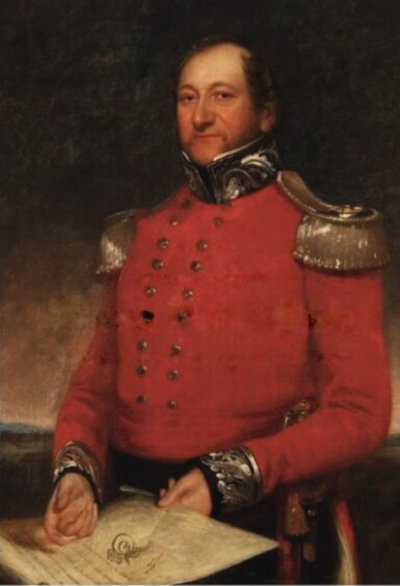 Sir Moses Montefiore, by Solomon Alexander Hart, c. 1840s.
Sir Moses Montefiore, by Solomon Alexander Hart, c. 1840s.
Seeing that the charges would not be dropped and the libel would continue, Montefiore and Cremieux chose to turn to Sultan Abdul Mejid of the Ottoman Empire, since he was the actual leader over the region, albeit, largely powerless. They asked the Sultan to issue a decree proclaiming blood libels as false and prohibiting prosecuting Jews based on such accusations. The Sultan acquiesced and issued his decree on November 6, 1840. In a noteworthy act, he condemned the blood libel, stating clearly that it was completely false and that “Muslim theologians had examined Jewish religious books and found that the Jews “are strongly prohibited from not only from using human blood but even from consuming that of animals. It therefore follows that the charges made against them, and their religion are nothing but pure calumny.”
Nevertheless, for years to come, and on antisemitic websites until today, the Catholics of Damascus would continue to tell the story of the friar murdered by Jews for his blood and that the Jews had only been let free due to the influence of powerful Jews from other countries.
In the aftermath of the Damascus Affair, numerous questions arose. How could France, a country that gave civil equality to the Jews in 1791 and gave its Jewish population the most legal rights, openly support the patently false blood libel accusation and even allow torture to be used to extort confessions?
Most historians conclude that the answer was national self-interest. France’s leaders saw it as beneficial to maintain their foothold in Syria and felt that supporting the accusers against the Jews would work for them. By the same token, countries that were hostile to France used the opportunity to denounce France for its actions, as they were looking to increase their control in the Middle East and decrease the French influence there. So, Metternich, not known to be a friend of the Jews, denounced the blood libel charges, as did the leaders of Great Britain. The Damascus Blood Libel, which might otherwise have passed unnoticed in Europe, garnered international attention because of the rivalry of Europe’s great powers in the Middle East.
The Damascus Affair has been described as a turning point in modern Jewish history, particularly for French Jews, who were among the most vocal supporters that traditional Jewish nationalism was a thing of the past. They were patriotic citizens for whom religion was a private matter if it was relevant at all. Yet, when they were exposed to the antisemitism that France displayed in the Damascus Affair, French Jews were completely shaken up. In fact, all of world Jewry were shocked that the blood libel accusation - a throwback to the antisemitism of the Dark Ages - was initially accepted as fact by almost the entire press in Europe. How could it be that educated citizens and modern leaders could believe and support this baseless and ridiculous accusation? No reassuring answer was forthcoming.
In an act that would reverberate for the next two centuries, in 1846, a two-volume book was published in Paris, written by Achille Laurent (a pseudonym), Relation historique des affaires de Syrie depuis 1840 jusqu’en 1842. It claimed to document the complete protocols of the investigation in Damascus, yet completely omitted any mention of the extensive use of torture and only focused on the Jews as murderers and that the the blood libel was a proven fact.
These protocols were published in German, Italian, Arabic, and Russian in the coming years and decades. This book allowed antisemites to “prove” that the murder accusation had been proven and documented but that the Jews were released despite their guilt. In fact, Russian coverage of the Damascus Affair in the media is seen as one of the causes that led to the pogroms of the 1890s. Unfortunately, these protocols continue to be published and publicized, particularly in the Arab-language media.
One of the end results of the Damascus Affair was its awakening of Jewish awareness for the need to cooperate to address Jewish needs and respond to charges and attacks towards Jews around the world. In the following decades, for the first time in modern history, multiple such organizations would form to address these concerns.
The subsequent blood libel that made international news was that of Menachem Mendel Beilis in Russia, in 1911. The lawyer who headed the defense team, the legendary Oscar Gruzenberg, was certain that the prosecution's attack would take quotes out of context from the Talmud and use it them to accuse the Jews.He had Rabbi Mazeh, Chief Rabbi of Moscow, head a rabbinic advisory team for the defense, and prepare answers to the inevitable questions. As Gruzenberg had predicted, at the trial the prosecution quoted the Talmudic statement in Tractate Yevamos 61a, "You (the Jewish people) are called "Adam" (Man), and the other nations are not called "Adam" (Man)."
The prosecuters demanded, “How could the Jews claim only they are called man, and the other nations are not called man?! It must mean that they view non-Jews as subhuman!”
The defense had an answer prepared, given to them by Rabbi Meir Shapiro, who was already renowned as a brilliant and eloquent leader of Polish Jewry. He explained that the quote reflects an essential characteristic of the Jews and was not intended an insult to the other nations.
Rabbi Shapiro explained that that the Talmud (Shavous 39) teaches Kol Yisrael areivim zeh lazeh, all Jews are responsible for each other. He elaborated that in the court, the fate of a single Jew - Mendel Beilis - was being decided, yet the judgement touched Jewish people all over the world.
Rabbi Shapiro directed the defense team to ask the judge, “If an Italian citizen was arrested in Poland or a Frenchman in Germany, all of Italy or all of France be praying on his behalf and advocating for his acquittal? Would Italians or Frenchmen all over the world be constantly worried about him and awaiting news of his release? Of course not. Yet, when one Jew in Russia is falsely accused of murder, the entire Jewish nation stands with him, because we are truly one. The Talmud says Jews are called “Adam,” because “Adam” shows the unity of the Jewish nation. We are one, a single unit, just as Adam was one man. The word “Adam” in Hebrew has no plural, and that is why it represents the Jewish people, who are one, and this pronoun is not used to identify other nations, as the Talmud stated.”
This answer was understood, even by the accusers. This message continues to serve as a beacon of light of the connection Jews have with each other. In good times and bad, the Jewish People are one.

This is a beautiful article that have given me the meaning of Adam as viewed by the Jews. The unity among the Jews is unequalled and will continue to be stronger in the face of liars who are bent on destroying the Jews but cannot and will never be able to do it.
יישר כוח ר' מנחם!
Thank you for a well researched article. My grandfather's great grandfather was Rabbi Yaakov Antebi. In our family it was told he never ''confessed'' under torture. You are corroborating our family story.
Unfortunately, the Jewish blood libel is still very much alive today with many cartoons in Muslim countries portraying Israeli politicians and IDF soldiers as blood thirsty people seeking out Palestinian blood....a new version of an old story.
Roger Antebi
Brilliantly written article by scholar, Teacher, Tzaddik, Rav Menachem Levine!
The conclusion is the whole point of Torah, supported in Torah & in NACH in the Book of Yehoshua!
We are all responsible as one, except in rare identified circumstance!
Most profoundly applicable today in Israel with the war against Hamas!
We are all in this together! All as one!
Hearty yasher ko'ach, dear Rav Menachem!
May we all become aware & embrace each other always!
With deepest gratitude, humility!
Concise, lucid treatment of this dark page in history. This non-Jew greatly appreciates and enjoys your excellent journal.
Great article. I'm your new fan.
Did this catholic and his muslim helper ever found? Did they show up let's a year or so after this all happened?
I must confess that I either did not know about this ugly event, or forgot most of it. Of course the more famous event, and closer to the present was the Dreyfus scandal in which blood libel was not a major factor.
Israel and my home the U.S.A are refuges for the Jewish people. It is particularly comforting that people like Cooperman, Bloomberg, Ackman, Miriam Adelson, and many other wealthy powerful Jews are here too help us.
Israel must survive. We Jews must always be vigilant
With due credit to the Jews you mentioned who support their people, no success is guaranteed unless Hashem wills it! If we do His will and (especially) stand united, we are essentially invincible.
So sad that it takes tragedy or crises to bring us together, but our enemies should take heed that whenever they try to oppress us, they're the overall losers!
Just goes to show how much we need our own refuge - Israel - our home!
Our sanctuary from blood libels.
We need leaders like Sir Moses Montefiore today...
It's a fantastic article with a great message! Thank you, Rabbi Menachem Levine!!